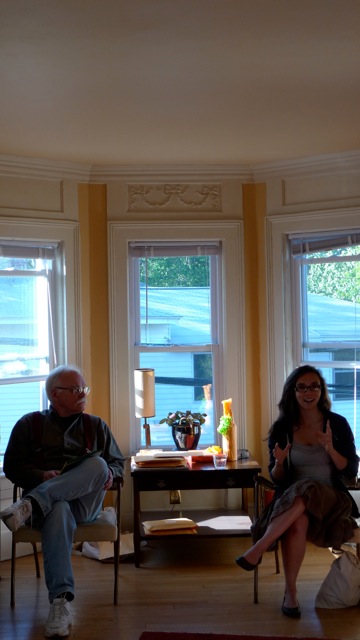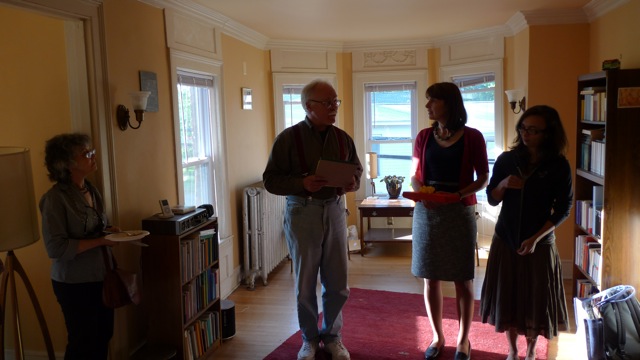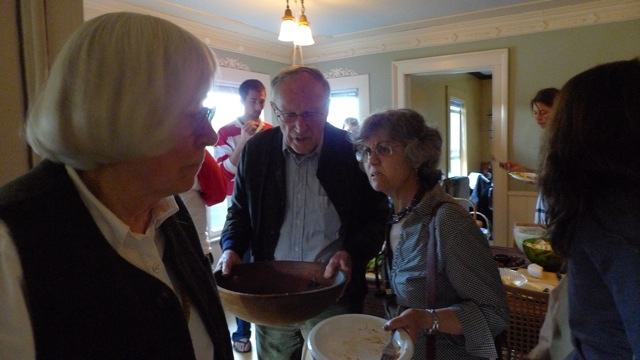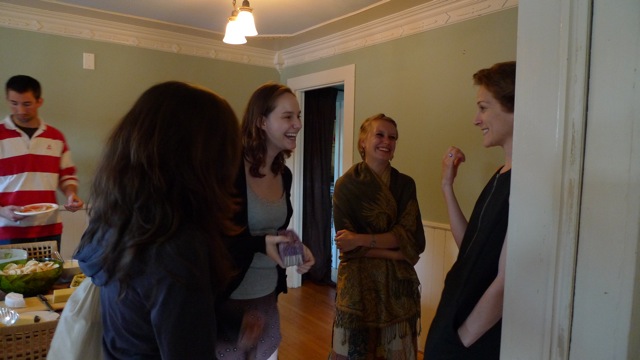 Uli Plass and Arne Höcker organized two panels on “The Scene of Writing, Non-Writing” at last week’s Conference of the German Studies Association in Oakland. The panels examined the “scene of writing, non-writing” as the writing scene that constitutes the law of modern literature insofar as it refers to a crisis of writing in which questions of authorship and subjectivity return to the foreground. Arne Höcker’s talk focused on Adalbert von Chamisso’s 1814 novella of Peter Schlemihl (the man who sold his shadow); Uli Plass discussed the two recent books by Rainald Goetz (“Klage” and “Loslabern”).
Uli Plass and Arne Höcker organized two panels on “The Scene of Writing, Non-Writing” at last week’s Conference of the German Studies Association in Oakland. The panels examined the “scene of writing, non-writing” as the writing scene that constitutes the law of modern literature insofar as it refers to a crisis of writing in which questions of authorship and subjectivity return to the foreground. Arne Höcker’s talk focused on Adalbert von Chamisso’s 1814 novella of Peter Schlemihl (the man who sold his shadow); Uli Plass discussed the two recent books by Rainald Goetz (“Klage” and “Loslabern”).
Deutscher Mittagstisch
Deutsch sprechen. Englisch essen.
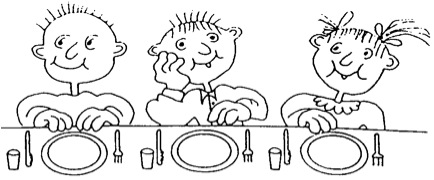
Faculty Dining Room
USDAN im dritten Stock
Mittwoch, den 13. Oktober
12.15 – 13.15 Uhr
Authority, Responsibility, and Creative Writing: Arne Höcker on Scientific Authorship
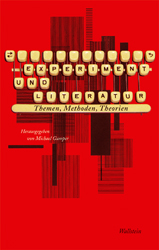 Arne Höcker’s article on Scientific Authorship appeared in the compendium Experiment und Literatur. Themen, Methoden, Theorien (ed. Michael Gamper, Wallstein Verlag). The compendium discusses topics, methods, and theories for the analysis of the relations of literature and scientific experiments, and focuses particularly on epistemological and poetological dimensions of the exchange between literature and the sciences. Arne Höcker’s contribution discusses problems of authorship in scientific discourse in regard to questions of scientific creativity, authority, and copyright.
Arne Höcker’s article on Scientific Authorship appeared in the compendium Experiment und Literatur. Themen, Methoden, Theorien (ed. Michael Gamper, Wallstein Verlag). The compendium discusses topics, methods, and theories for the analysis of the relations of literature and scientific experiments, and focuses particularly on epistemological and poetological dimensions of the exchange between literature and the sciences. Arne Höcker’s contribution discusses problems of authorship in scientific discourse in regard to questions of scientific creativity, authority, and copyright.
Everything You Always Wanted To Know About Regensburg But Were Afraid To Ask
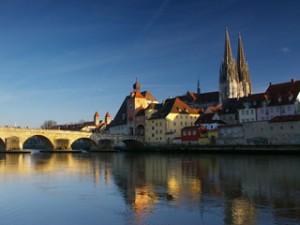 Friday, October 1, 2010, at the German Haus, 65 Lawn Ave at 4:30pm
Friday, October 1, 2010, at the German Haus, 65 Lawn Ave at 4:30pm
The German House is hosting an information session for students who are interested in studying at Regensburg University. Wesleyan students who participated in this program last semester will be attending this meeting and will talk about their experiences. Also invited are German students from Regensburg who are studying at Wesleyan this year. German Studies faculty will also be there tow answer questions.
Teaching German with Short Films
 On September 25, 2010, Iris Bork-Goldfield was invited by the American Association of German Teachers, New York Central to conduct a teacher development workshop at Syracuse University in Syracuse, NY. She spoke about how short films can enhance German language instruction, and gave examples on how to integrate these films into the curriculum. Participants were graduate students, high school teachers and university professors.
On September 25, 2010, Iris Bork-Goldfield was invited by the American Association of German Teachers, New York Central to conduct a teacher development workshop at Syracuse University in Syracuse, NY. She spoke about how short films can enhance German language instruction, and gave examples on how to integrate these films into the curriculum. Participants were graduate students, high school teachers and university professors.
On one page …
… of today’s FAZ (Frankfurter Allgemeine Zeitung Nr. 220, 22. September 2010):
Leo A. Lensing’s article on Karl Kraus in “Fotogeschichte” (see earlier post) inspires the German Professor Martin Stingelin to write about the use of photographies by Karl Kraus: “Echt medial”
On the same page:
the review of the conference “Die amerikanischen Götter”. Transatlantische Prozesse in der deutschsprachigen Popkultur seit 1949, to which Uli Plass contributed a talk titled “Totalschaden: Zur Dialektik von Adornos Pop-Kritik” last weekend at the University of Freiburg/Breisgau.
Here it is (on one page):
New Translations by Krishna Winston
Hans Jonas, Memoirs (Brandeis UP, June 2008)
Peter Handke, Crossing the Sierra de Gredos (Farrar, Straus, Giroux, April 2009)
Peter Handke, Don Juan: His own Version (FSG, Feb. 2010)
Werner Herzog, Conquest of the Useless (HarperCollins paperback, June 2010)
(Here is a New York Times review of this book)
And coming on Nov. 10, 2010:
Günter Grass, The Box (Harcourt)
Deutscher Mittagstisch
Deutsch sprechen. Englisch essen.

Faculty Dining Room
USDAN im dritten Stock
Mittwoch, den 22. September
12.15 – 13.15 Uhr
Arne Höcker on the Figure of the Prison Chaplain

Arne Höcker’s article on the prison chaplain appeared in a German anthology on “The Figure of the Third”. His article reconstructs a transformation in historical discourse and practice within the penal system around 1900. It investigates the constitutive role of the prison chaplain for the creation of knowledge about “the criminal”.
Sommerfest – Celebrating the End of the Academic Year
On May 8, we came together to honor our students and to celebrate the end of the academic year.
Here are some pictures:
Heather Stanton ’10, who is about to graduate with a double major in History and German Studies, presents her Honor-Thesis “Where German Hearts are Molded: Historical Memory and State Legitimation in the German Democratic Republic, 1945-1989.”
The chair of the German Studies department Leo Lensing awards prizes to our students:Linnea Damer ’10 won the Scott Prize, Heather Stanton ’10 won the Prentice Prize, and James Gardner ’13, Matt Alexander ’12, and Katherine Wolf ’12 the Blankenagel Prize. Adam Rashkoff ’13, Adrian Rothschild ’12, and Catherine Doren ’13 received the annual Book Prize presented by the Department of behalf of the German Consulate in Boston.
Iris Bork-Goldfield was honored for being an enthusiastic teacher, a great thesis-advsisor for Heather Stanton’s Honor Thesis, and not at least a wonderful colleague.
From left: Helen Reeve, Jerry Wensinger, and our colleague and Dean of the Arts and Sciences, Krishna Winston; in the background: Matthew Alexander.
From left: our students Anya Olsen and Catherine Doren, in the background: Matthew Alexander.
And now, we wish our seniors a wonderful and happy commencement, and everyone a joyful and sunny summer!!!
Leo Lensing deconstructs the Coffeehouse Myth at the Austrian Embassy
On March 19, Leo A. Lensing gave a lecture at the Embassy of Austria on
Demolition Man: Karl Kraus and the “Deconstruction” of the Coffeehouse Myth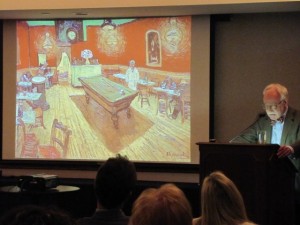
No other great culture is as intimately associated with the coffeehouse milieu as what has come to be known as “Vienna 1900,” the era of Freud and Wittgenstein, of Klimt and Schiele, of Schnitzler and Hofmannsthal, of Adolf Loos and Josef Hoffmann. Yet the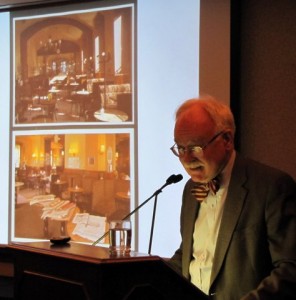 Viennese coffeehouse was not merely an architectural project, an actual meeting place or a literary topos. It often represented a hotly contested “marketplace of ideas.” Karl Kraus, whom many consider the greatest satirical writer of the 20th century, undoubtedly enjoyed the sociability and intellectual exchange fostered by the coffeehouse. But he also viewed this typically Viennese institution as a symbolic location of dubious reputation. The coffeehouse figures in his work – from the early satirical sketch. A Literature Demolished, which took its inspiration from the razing in 1897 of the famous Café Griensteidl, to his great anti-war drama The Last Days of Mankind (1922) – as an often comic stage upon which cultural superficiality and ideological corruption reveal themselves.
Viennese coffeehouse was not merely an architectural project, an actual meeting place or a literary topos. It often represented a hotly contested “marketplace of ideas.” Karl Kraus, whom many consider the greatest satirical writer of the 20th century, undoubtedly enjoyed the sociability and intellectual exchange fostered by the coffeehouse. But he also viewed this typically Viennese institution as a symbolic location of dubious reputation. The coffeehouse figures in his work – from the early satirical sketch. A Literature Demolished, which took its inspiration from the razing in 1897 of the famous Café Griensteidl, to his great anti-war drama The Last Days of Mankind (1922) – as an often comic stage upon which cultural superficiality and ideological corruption reveal themselves.
Deutscher Mittagstisch
Deutsch sprechen. Englisch essen.

Faculty Dining Room
USDAN im dritten Stock
Freitag, den 30. April
12.15 – 13.15 Uhr
Jason Kavett ’09 and Andrew Kirwin ’09 join German Department at Yale


Jason Kavett ‘09 and Andrew Kirwin ‘09, who graduated with a major in German and COL last year, are going to pursue their careers in German Studies as graduate students at Yale University. After having received offers from prestigious German programs at Harvard, Princeton, Columbia, Berkeley, Hopkins or the University of Chicago, both Jason and Andrew decided to stay close to their Alma Mater in Middletown (although, the excellence of Yale’s German Department might also have influenced their decision).
Congratulations to Jason and Andrew!
Deutscher Mittagstisch
Deutsch sprechen. Englisch essen.

Faculty Dining Room
USDAN im dritten Stock
Freitag, den 16. April
12.15 – 13.15 Uhr









